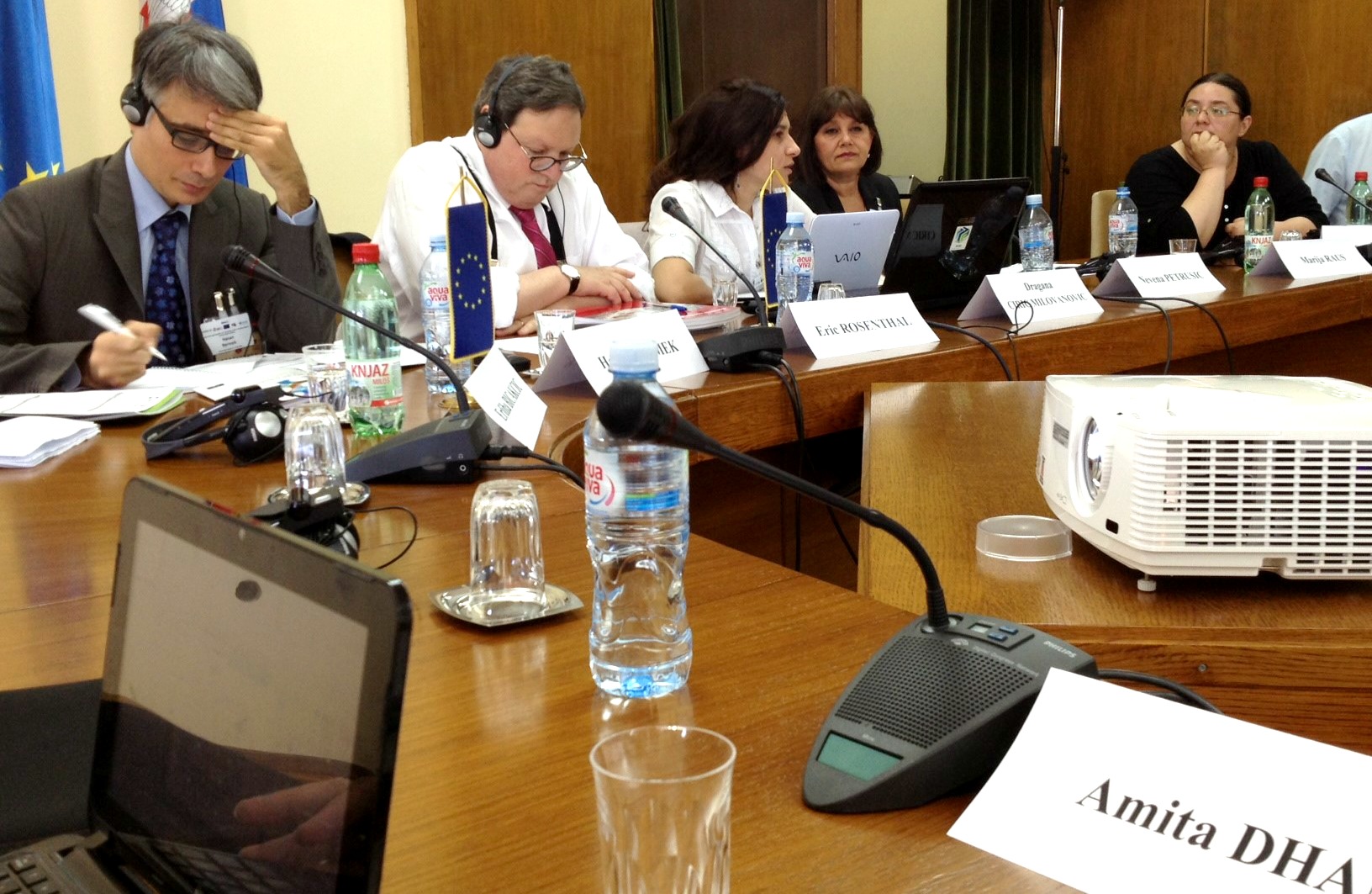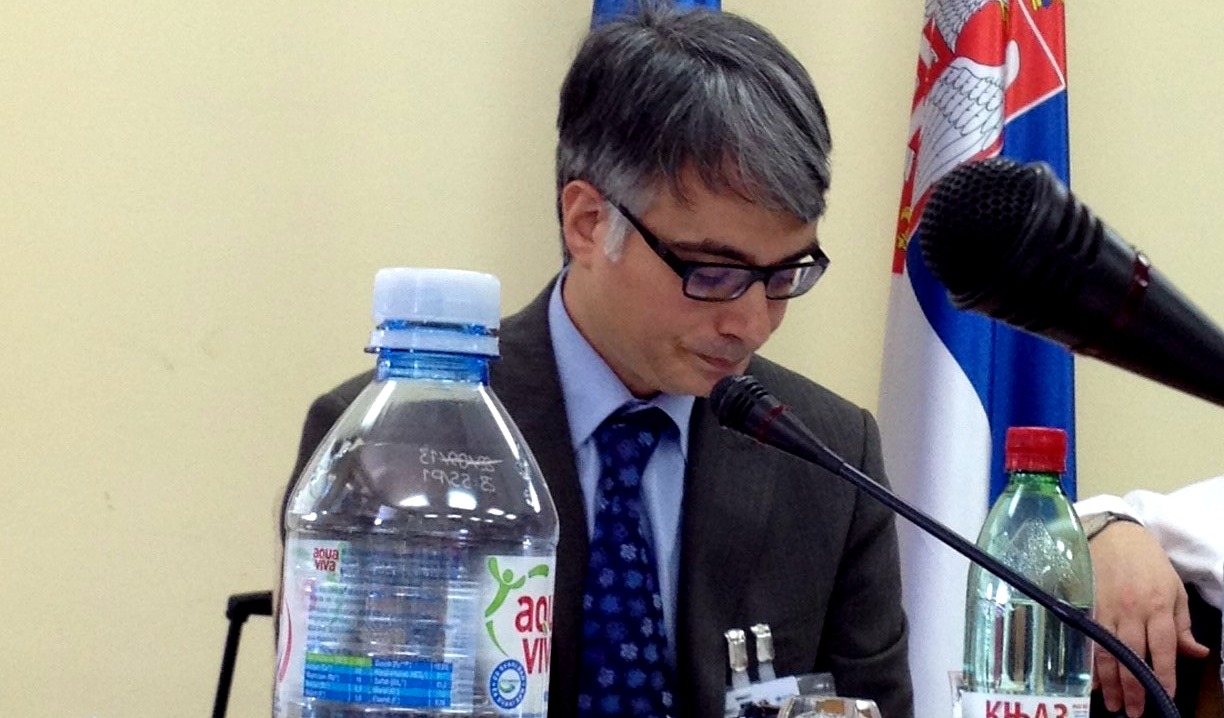Last Tuesday I participated in the first day of a two-day conference in Belgrade, about legal capacity and community living, organised by various NGO partners in the “Person” project, which is funded by the European Commission (aka European taxpayers).
In 2007 MDAC published a report called “Guardianship and Human Rights in Serbia”. The content is still pretty much accurate, as the guardianship law in Serbia hasn’t changed since 2007. Yet the issue is now much more and it was great to hear the discussion has moved on. The 50 or so attendees at the seminar were a mix of international legal capacity experts and NGO people from the west Balkans. Of particular interest to me were that there were several judges.
 Participants of the conference in Belgrade
Participants of the conference in Belgrade
Brutal and binary
Serbia has a typical European system of plenary and partial guardianship, but forget about the latter because most people are under the former, which has MDAC and others have characterised as “civil death”, because once you’re under plenary guardianship, you are prohibited from taking any meaningful decisions in your life.
The “Annual Report on Social Welfare Centre’s Activities 2011” found that the number of people placed under guardianship had risen to 3,500 people in that year alone, an increase of a third compared with the previous year. The government does not know the total number of people under guardianship, despite its obligation under Article 31 of the CRPD to collect this kind of data. As the CRPD says, data is needed to “formulate and implement policies to give effect to” the Convention. In other words, numbers matter.
Quality matters too. In 2008-2010 the Mental Disability Rights Initiative Serbia carried out a mammoth piece of research in partnership with the Belgrade Centre for Human Rights. They examined 997 judgments from lower courts and 68 from higher courts. They found that in in 57% cases the person in question had experienced institutionalisation. Staggeringly, the judges in 84% of the cases did not even see (let alone bother to ask questions to) the person whose legal capacity was in question.
We learned how easy it is to get under guardianship: they get a mental-something diagnosis from a medic, the judges look at that and then place them under guardianship. It really is as simple as that. Court-appointed medical experts write things like, “This person should be deprived of legal capacity” in their reports, yet they are not supposed to answer any question of the sort. They’re supposed to give their medical opinion limited to diagnosis and prognosis – this of course bears only marginal relevance for a system where the only option is to take away legal capacity in all areas of life, or leave the person alone with no supports whatsoever. In Serbia, like many countries, judges sloppily rely on sloppy medical reports.
Nevena Petrušić, the Commissioner herself, said that people with disabilities are, according to public opinion, among the three most discriminated-against groups, the others being the poor and the Roma. There is a triple-circle Venn diagram of these groups, and it’s not surprising that “decision-makers and service providers and ordinary citizens who live next door to people with psycho-social or intellectual disabilities” have prejudices against them. Legal categorisations of guardianship impact negatively on people with disability and reinforced out-dated biases, said Petrušić. “Everything is based on the medical model,” added Kosana Beker, assistant to the Commissioner.
Eric Rosenthal, Executive Director of Disability Rights International reminded the conference that, “to appreciate where we are, we have to understand where we have come from”. Recounting his trips to Serbian institutions in the run up to the release of their 2007 report “Torment not Treatment”, he told the audience that researchers saw children locked in orphanages, strapped to their chairs. When he released the report, Eric received threats to his own physical safety, with people warning him never to walk on the streets of Belgrade again. While it is remarkable that so much change has happened, he said, there are still huge problems in Serbia with regard to the rights of people with disabilities, and it’s up to the assembled experts to find solutions.
Legal capacity is the human rights mainstream - woot!
Hasan Bermek, Advisor to the Commissioner for Human Rights of the Council of Europe, (and my restaurant buddy whenever I visit Strasbourg) gave a few suggestions about how participants could find solutions. He presented the Commissioner’s issue papers on legal capacity (in Serbian) and community living (in Serbian). Hasan explained that both Thomas Hammarberg – the previous Commissioner – and the current commissioner Nils Muižnieks, have consistently stated that the UN Convention on the Rights of Persons with Disabilities (CRPD) is the global benchmark with which governments have to comply, and the CRPD supersedes Council of Europe standards. Hasan pointed out that all but two of the 47 Member States of the Council of Europe have signed the CRPD. A silence descended upon the room as he named and shamed the naughty countries [wait for it…] Lichtenstein and Switzerland.
 Hasan Bermek
Hasan Bermek
Goodbye Mr Rational Man!
Hasan said that the idea of a rational and reasonable person required by most laws is in fact a myth which needs to be debunked. The reality is of course that people decide on the basis of a combination of cognition and emotion, having rejected or accepted the opinions of others. For me this was fabulous. I couldn’t imagine even two years ago hearing someone representing a ‘mainstream’ human rights official saying something like that.
Commenting on Hasan’s presentation, law professor from India and legal capacity guru Amita Dhanda said that she felt vindicated by her own work during the negotiations which led to the UN Convention on the Rights of Persons with Disabilities. It was argued there that humans are not rational animals, and that we need both independence and interdependence: “Perhaps there’s something to be said for the power of an idea”, she said. Amita argued that we can only get practical implementation unless we understand the underlying theories. Of course, you would expect an academic to say that, but it is terribly depressing in my experience, that government people and NGO people alike seek to dislocate theory from policy.
Amita explained that in guardianship support is premised on diminishing the individual, but under a support model it is integral to human nature. “The humanness of the person is for the first time being openly acknowledged” in the CRPD. This is “ordering a new era for human rights” because it’s not just reason, but neediness but makes us human. Putting it simply: “if we are needy we need support.”
Paradigm shifting or fiddling?
Amita picked up on a point which is a constant struggle in MDAC’s advocacy (and I am sure that of many other NGOs), namely the tension between arguing for a completely different paradigm, and calling for improvements to the existing one. She warned against bringing in cosmetic changes rather than real ones. Finally, Amita made the point that guardianship systems are over-inclusive (because indiscriminately, anyone and everyone with disabilities is included) and under-inclusive (just because I do not have a mental impairment I may need support). On the under-inclusive point, see this OliverTalks post on how support services are offered to people without disabilities too.
Amita’s presentation prompted a participant from Serbia to comment that, “Social solidarity is something we have to work further on.” I wasn’t sure whether this was a call to action, or a dismissal of everything that had been said.
***
My e-advisors keep telling me off for writing too much on these posts. So tune in tomorrow for a summary of presentation which I gave – on legal capacity litigation.
I would like to thank my friend Milan M. Marković (PhD student at the University of Graz, and MDAC Summer School 2012 alumn) for research assistance with this post.
UPDATE 29 May 2013 15.53
The 2008-2010 research mentioned in the 'Brutal and binary' section was not carried out by the Belgrade Center for Human Rights, but by the Mental Disability Rights Initiative Serbia in partnership with the Belgrade Center for Human Rights. Textual changes were made accordingly.